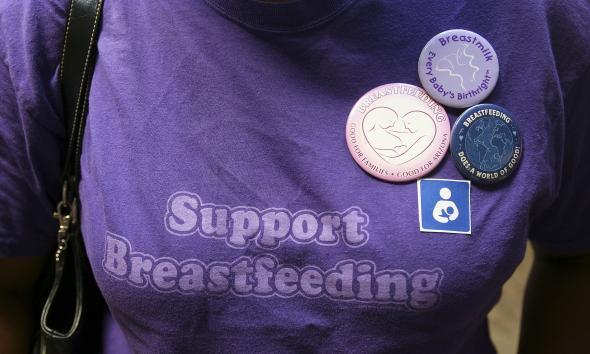No one knows exactly what causes prenatal and postpartum depression. It’s a complicated dance of hormones, predisposition to depression, and other factors. A new study, presented at the 109th Annual Meeting of the American Sociological Association this week, explores the cultural pressures that new moms face—also dads, but I’m going to focus on moms here—and how they impact depression.
University of Kansas sociology doctoral student Carrie Wendel-Hummell spoke to 30 middle- and low-income moms who had symptoms of “perinatal mental health disorders” (PMADs)—which include prenatal and postpartum depression and anxiety, postpartum psychosis, bipolar disorder, obsessive compulsive disorder, and post-traumatic stress disorder—and found that some of the biggest factors in exacerbating their PMADs were breast-feeding troubles, sleep deprivation, and unhelpful partners.
While the public health push for breast-feeding is certainly good overall, Wendel-Hummell’s study, while extremely small, should make us consider that the messaging toward and treatment of new moms who are struggling with breast-feeding might be counterproductive and harmful, particularly to moms also dealing with PMADs. “My research findings also demonstrate how these messages lead to significant mental health stress when breastfeeding does not go well, including internalized guilt for not giving their children what is perceived as the absolute best,” Wendel-Hummell writes.
Though low-income women felt less guilt about breast-feeding than their middle-class counterparts, “Low-income women still spoke of feeling pressured to breastfeed by doctors and nurses,” Wendel-Hummell notes. “Even a mother who chose to pump and bottle her breast milk, rather than nurse due to past sexual abuse, was continually pressured to nurse by her doctors. Others felt intimidated or manhandled by lactation specialists.” One low-income mom told Wendel-Hummell: “I was so tense and so stressed and then also the lactation nurse in the hospital, she was very intimidating and basically it made me feel like I was stupid for not comprehending how and what to do and I was afraid to ask.”
Depressed low-income moms were especially stressed by their lack of maternity leave. Many of them had to go right back to work after giving birth, and working with a very small infant left them sleep deprived and unhappy. “I was so tired. I still didn’t get sleep much at night, up every hour, two to three hours for the whole entire night and then turn around and work all day without taking a nap during the day, it was really hard,” said one low-income mother. This jibes with other research about low-income women and postpartum depression. One study of more than 4,000 women in Iowa showed that 40 percent of women who had $20,000 or less in household income had “clinically significant postpartum depression,” compared with just 13 percent of women who had $80,000 or more in household income.
As for middle-class moms, they were especially stressed by images of cultural perfection that they felt they weren’t living up to. As Wendel-Hummell describes it, “Motherhood is thought to bring total self-fulfillment and happiness, and mothers are expected to perform their duties perfectly with little assistance from others.” One middle-class mom said, “What set me over the edge was having those expectations that I was setting upon myself. … Expectations around parenting and what I should be doing with sleep and what I should be doing during the day.”
Of course, this is a very small study, and we can’t draw any sweeping conclusions from it. It doesn’t mean that these women would not be depressed if they breast-fed easily or if they had ample maternity leaves or if they had better family support. But certainly these things are not helping them feel like their best selves. I am a broken record these days in my exhortations to lay off judging new moms and to give them some goddamn maternity leave. So I’m glad that Wendel-Hummell did this study, and that we hear more and more voices of new moms who are struggling. The louder we are, the likelier we are to see some actual cultural and political change.
